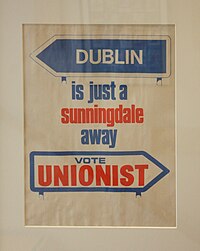| Ulster Workers' Council strike | |||
|---|---|---|---|
| Part of The Troubles | |||
 A 1974 poster by unionists opposed to the Sunningdale Agreement. It implied that the agreement would lead to "Dublin Rule" (that is, a united Ireland), to which unionists were opposed. | |||
| Date | 15–28 May 1974 | ||
| Location | Throughout Northern Ireland | ||
| Goals | Abolition of the Sunningdale Agreement and Government of Northern Ireland | ||
| Methods |
| ||
| Resulted in | Government of Northern Ireland prorogued; direct rule re-introduced | ||
| Parties | |||
| |||
| Lead figures | |||
| Casualties and losses | |||
| |||
The Ulster Workers' Council (UWC) strike was a general strike that took place in Northern Ireland between 15 May and 28 May 1974, during "the Troubles". The strike was called by unionists who were against the Sunningdale Agreement, which had been signed in December 1973. Specifically, the strikers opposed the sharing of political power with Irish nationalists, and the proposed role for the Republic of Ireland's government in running Northern Ireland.
The strike was organised and overseen by the Ulster Workers' Council and Ulster Army Council, which were formed shortly after the Agreement's signing. Both of these groups included Ulster loyalist paramilitaries such as the Ulster Defence Association (UDA) and Ulster Volunteer Force (UVF).[1] These groups helped to enforce the strike by blocking roads and intimidating workers.[1][2][3][4] During the two-week strike, loyalist paramilitaries killed 39 civilians, of whom 33 died in the Dublin and Monaghan bombings.
The strike succeeded in bringing down the power-sharing Northern Ireland Assembly and Executive. Responsibility for the government of Northern Ireland then reverted to the Parliament of the United Kingdom at Westminster under the arrangements for 'Direct Rule'.
The successful strike was later described by the then Secretary of State for Northern Ireland, Merlyn Rees, as an "outbreak of Ulster nationalism".
- ^ a b Bloomfield, Ken. A tragedy of errors: the government and misgovernment of Northern Ireland. Liverpool University Press, 2007. Page 46.
- ^ David George Boyce and Alan O'Day. Defenders of the Union: a survey of British and Irish unionism since 1801. Routledge, 2001. Page 255.
- ^ Tonge, Jonathan. Northern Ireland: Conflict and Change. Pearson Education, 2002. Page 119.
- ^ "CAIN: Events: UWC Strike: Anderson, Don. – Chapter from '14 May Days'". cain.ulster.ac.uk. Archived from the original on 7 July 2020. Retrieved 9 February 2020.
